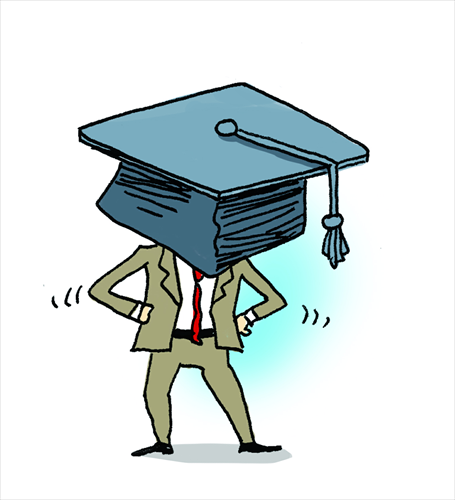Fake degrees cause real dangers across world

Illustration: Liu Rui/GT
A recent expose of a huge fake diploma operation, taking in millions of dollars a month, by The New York Times has fixed attention again on the problem of "diploma mills," fraudulent operations that hand over unearned degrees in return for cash. Although this particular operation is based out of Pakistan, fake diplomas are a global problem. Thousands of them are sold every year in the US alone, and tens of thousands worldwide. Some naïve buyers may believe they're acquiring a genuine degree "awarded based on life experience," the majority pay the substantial price - often thousands of dollars - for their own ends.
As John Bear and Allen Ezell point out in their book Degree Mills, unqualified "doctors" have fatally misdiagnosed patients, unqualified forensic specialists and psychologists have wrongly sent people to jail after being called upon as expert witnesses, and companies have lost million-dollar lawsuits after their staff's qualifications turned out to be fake.
Purchased degrees add unearned authority to popular quacks, such as TV nutritionist Gillian McKeith, who used the title of "Dr" to give herself credibility until a campaign led by genuine doctor Ben Goldacre pointed out that her degree had been purchased online. Goldacre thoughtfully purchased the same degree for his cat.
Fake degrees are a particular problem in China, where study abroad has become vastly more common over the last decade, and where HR staff often have no training in how to distinguish a real degree from a fake one. It's hard enough for an American personnel manager to know that LaSalle University, Louisiana, was a fake that took in $50 million in fees, while LaSalle, Pennsylvania, is a real, respectable institution, let alone for Chinese staff to keep up with the flurry of fakes. And the Chinese who buy degrees often do so in good faith, believing they're enrolled in real colleges.
The government can do more to remind companies to check out credentials through phone calls and Internet records, and to educate the public in the signs that a college is the real deal. But the explosion of fake qualifications also points to another problem, and one that can't be tackled by public education or legal enforcement.
A huge number of jobs that once required nothing more than intelligence and willingness now demand that applicants possess at least a bachelor's degree, while others now insist upon specific master's degrees.
In some areas, such as medical-related fields, this is because the work has genuinely become more complicated with the advance of technology. But in most it's little more than a way for HR managers to screen out applicants without having to think about it, or an inane demand for credentials out of some desire to make the job seem more important or valid.
As a result potential employees who are, in fact, perfectly capable of doing the job, turn to fake credentials to prove their worth. In the words of a paper by Creola Johnson, "The employer pretends to need a degree, the employee pretends to have one."
A degree is not a particularly good marker of whether somebody is smart, hard-working, or will be a good employer. It is a good marker of the status of your parents. It's a lot easier for middle-class and higher kids to jump through the educational and financial hurdles to go to university than it is for the children of the poor. That's particularly the case in the US, where tuition fees have exploded at rates far exceeding inflation over the last three decades.
But it's also true in China. A university education here has moved from becoming a rarity to, for the urban middle classes, being a necessity. Now the increasing demand for credentials, at the same time as the urban middle class is snatching up public educational resources, is knocking out the rungs at the bottom of the ladder.
We should be wary of fake degrees. But we should also be wary of the reasons that drive people to claim them, and remember that paper qualifications aren't the only, or even perhaps the best, way to judge people.
The author is an editor with the Global Times. jamespalmer@globaltimes.com.cn